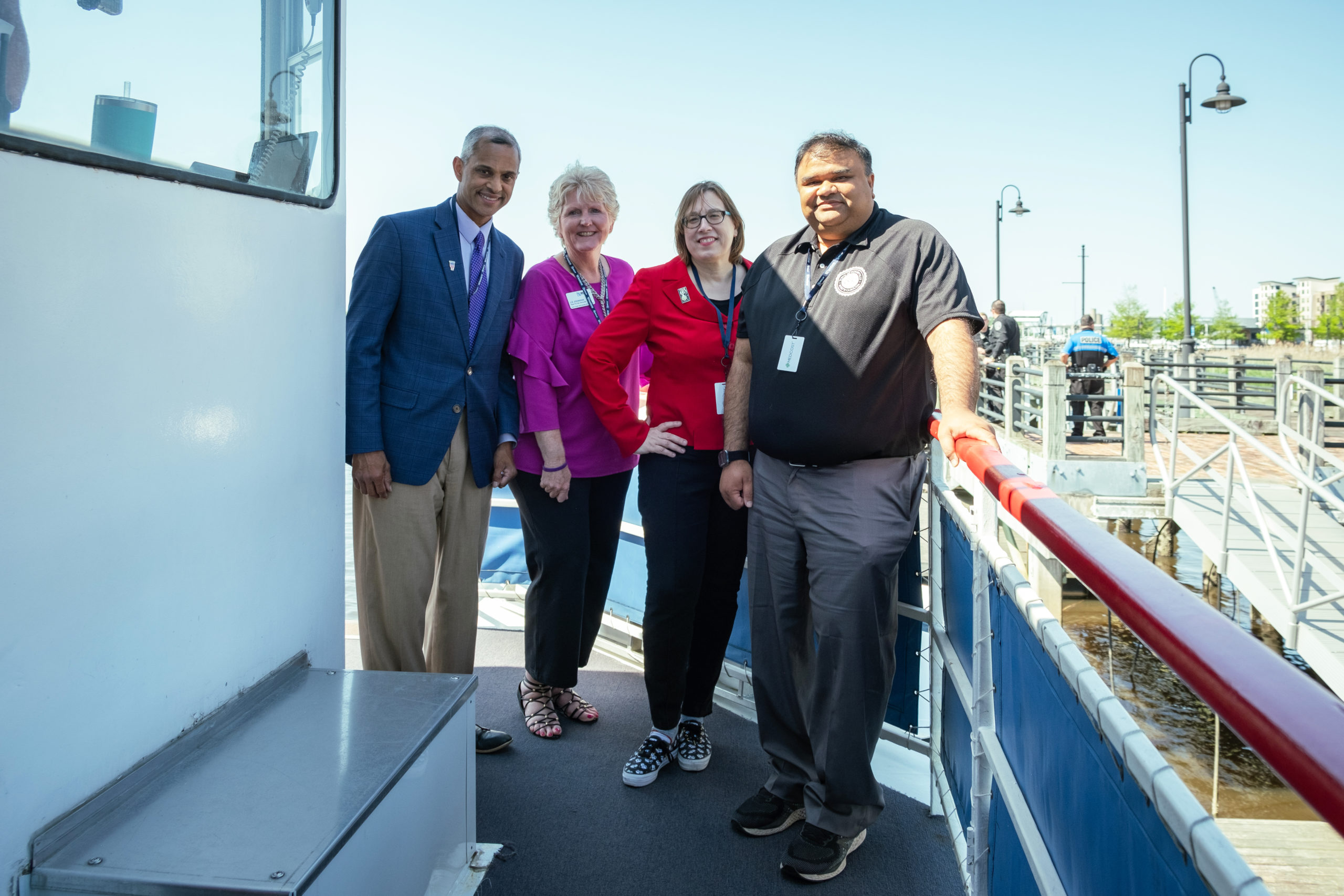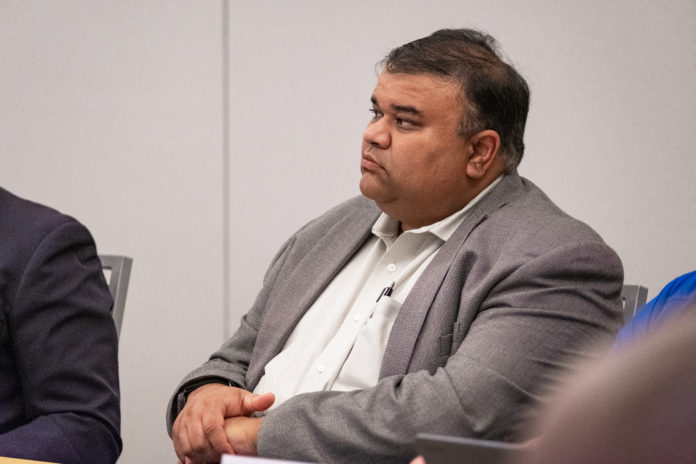Dedicating many hours of every day to the community and at-the-ready to help even the smallest of issues, Satish Garimella is the right person at the right time for Morrisville.
Satish Garimella occupies a unique position in Morrisville—one that goes well beyond the typical scope of a locally elected councilperson. It’s not something bestowed on him by election at all. Rather, it’s built on a burgeoning reputation for effectiveness and representation, both towards the town as a whole and the individuals that reside in it. Garimella was born and raised in Mumbai, and nearly 47 percent of Morrisville is of Asian descent—the vast majority being Indian. “Morrisville has a lot of immigrants, and they want someone they can relate and talk to about shared experiences and opportunities to be a part of this community,” said Garimella. “They want someone to help provide them a voice for awareness and understanding.”
Garimella fills this need admirably and relentlessly. The impact is seen clearly in a few numbers:
Eight. The number of one-on-one engagements, both over the phone and in person, Garimella estimates he has with citizens on any given day, some of which take hours and nearly all of which come from people he does not previously know. “I have an open-door policy, and people come,” he said. “I’ll take it. They’re coming to me not because they’re my best friend—they’re coming because they have no one else whom they feel they can go to.”
Nineteen. The number of hours Garimella fits into his working day, from 5am until at least midnight, much of which is spent dealing with the aforementioned pleas for assistance. With the support of his wife, Bhanu, their son, Vaibhav, and his mother and father, he is more than just an elected representative. He is a resource, and a confidant, and a lifeline for help, often for people who are facing serious uncertainty.
Three hundred. The number of Morrisville families Garimella helped with expedited travel to India during the pandemic, allowing them to be with sick or dying loved ones. He facilitated arrangements through long-maintained relationships with the Indian embassy in Washington DC, and ensured that Morrisville community members were prioritized under India’s rules at the time. “I didn’t know 80 percent of them, but the word went out that this guy can help you,” Garimella said. “And when someone comes to my door, I’ll never tell them no.”
 One hundred thousand. The number of free or reduced fee lunches that Morrisville and its partners provided throughout the pandemic to schools, homeless shelters, and other organizations, through the coordinating leadership of Garimella.
One hundred thousand. The number of free or reduced fee lunches that Morrisville and its partners provided throughout the pandemic to schools, homeless shelters, and other organizations, through the coordinating leadership of Garimella.
Four hundred. The amount of people that helped Garimella’s first campaign. “I had great support from all segments of the community, not just Asian Indians, and they made it easy for me to focus on the issues and sharing my message,” he said. The win, according to Garimella, marked the first time an Indian-born American had won election in the state of North Carolina.
And, about 2,000. If any number tells the story of what Garimella means to Morrisville, it is this one because this is the amount of people that came to see Garimella when he had no assistance to give. It took place during a months-long, near-death hospital stay. This count includes family and friends of course, but also people he had helped and otherwise didn’t know—or simply people he didn’t know at all, but would likely help in the future.
Even when defined by figures, much of Garimella’s impact is incalculable. For a growing city comprised of a growing international population, Garimella’s commitment and work, as he notes, more closely resembles the role of public officials in India. “People there fall back on the politicians to move the needle. They don’t have anyone else to fall back on. Here, it is not like that.”
Garimella’s local political career began without political aspirations at all. The child of two university professors, Garimella’s first goal was to simply match the education level of his parents. His father served as vice chancellor to a dean of a university in Mumbai, and was a professor with an expertise in mathematics, statistics and demographics. He would report to the Government of India in a job similar to a demographer, researching policies dealing with issues such as overpopulation and public health. Garimella’s mother was a PhD professor of sociology and a post-doc in psychology. Both also serving as counselors, Garimella remembers viewing their work through the lens of public service.
Already a degree-holding electrical engineer, Garimella and his parents decided that he too should pursue post-graduate education, and that he should do it in the United States. In 1997, he made the move to Tulsa, Oklahoma where he earned a master’s in computer science. Next, Garimella moved to Kansas for one year, then finally to North Carolina, residing near his cousin, a chief resident at Duke University Hospital in Durham. From there, he embarked on a 20-year career at AT&T as an architect on the senior technical staff, overseeing teams on five continents. “A very demanding job,” Garimella said. “I loved it.”
The journey could have settled there, especially considering how well the career aligned with Garimella’s talent of analytical thinking. “My philosophy is very simple. If I know the answer, I’ll get it done,” Garimella said. Instead, it served to inform his future path as an elected official, which launched at perhaps the most innocuous of public forums: his neighborhood homeowners association. Garimella joined the HOA in 2013, and almost immediately began making a difference. The big issue was a park. Promised by a local developer as part of a rezoning arrangement, the park had not materialized. “It had been ignored for about 15 years,” Garimella recalls. He got to work organizing behind the cause, rallying, conducting door-to-door campaigns, and meeting and building relationships with the Town Council at the time. The result: Northwest Park, which Garimella calls one of the best in Morrisville.
His work on that issue gained attention. Shortly afterwards, Garimella was approached and asked to run for an open seat on the Town Council, being told that it was, as Garimella remembers the pitch, just two meetings a month. “I got tricked,” Garimella said. “But it’s a good trick. It takes a lot of my time, but I’m happy.” He ran in 2015 and won handily, receiving more than 60 percent of the vote.
Already a fixture in the community at this point, Garimella now began to step into the all-out citizen advocate role he’s since become known for, utilizing a public service approach comprised of the inspirations gathered from his parents’ work and his own problem-solving ability. He’d soon gain another attribute—an addition gleaned through a harrowing ordeal that altered his perspective on people, community and work ethic forever. It started with a spider bite.
Shortly after his election, Garimella and the other members of the Morrisville Town Council took a coastal retreat, where they toured the area and reviewed many local success stories. Along that walk, Garimella felt a small, almost painless insect bite, and looked down to see a spider on his leg. “I knew something went in, but I brushed it off,” he said. “Life went on.” He had a scheduled trip to India beginning that next week, so he flew straight from the retreat with still no sign of injury or any sort of harm whatsoever. That status quo began to quickly change about four days into his trip. First, the bite developed into a small bump, but trivial enough to be dismissed by the doctors in Garimella’s family. A few days later, the bump had grown. Then, Garimella’s entire leg inflated. He quickly videoed doctors back in the United States who advised him to take the next possible flight home. He followed their guidance, persevered through an excruciatingly painful international trip, drove straight from the airport to the hospital, and was ushered immediately into surgery. Garimella had been bitten by a brown recluse spider, and his leg was necrotizing. “The doctor said just one thing to me,” Garimella said, recalling the moment he awoke from surgery, “‘I think I’ve saved your life, but I’m not sure if I’ve saved your leg.’”
What followed was 14 surgeries, 40 days in the intensive care unit, and four months of bedrest. Garimella narrowly avoided amputation. This is when the parade of visitors, totaling in the thousands, came to see him—friends, family, colleagues, congressional staff, town and county staff, and on and on. His takeaways from that time are many and varied, from the size of his support system to the quickness with which life circumstances can change.
Mostly, though, he thinks of the nurses.
“I was not exposed to that level of hard work before,” Garimella said. “Understanding them, looking through the lens of them, it has completely changed my life. I learned how health workers work, and how much empathy they have. It changed my life. And from then onwards, I was more committed to public service.”
In the nearly seven years since that incident, Garimella has settled firmly into his elected position. He is proud of the big issues Morrisville has addressed during his time, from transportation problems to school and infrastructure improvement, and he sees a bright future for the rapidly growing Triangle town. He is most proud, though, of the smaller issues—the individual stories—and his ability to enact change on a person-by-person basis. “It inspires me,” he said. “There’s nothing better than getting that note from someone that says, ‘Hey, you helped us. It has gone a long way.’ It’s the small changes that make you realize the importance of public service.”
And, at least once a year, Garimella goes down to the hospital ward to pay a visit to the nurses and doctors that cared for him during his long stay. Albeit with roles reversed, it’s a small example of the Morrisville councilperson practicing what he preaches: an open-door policy.












